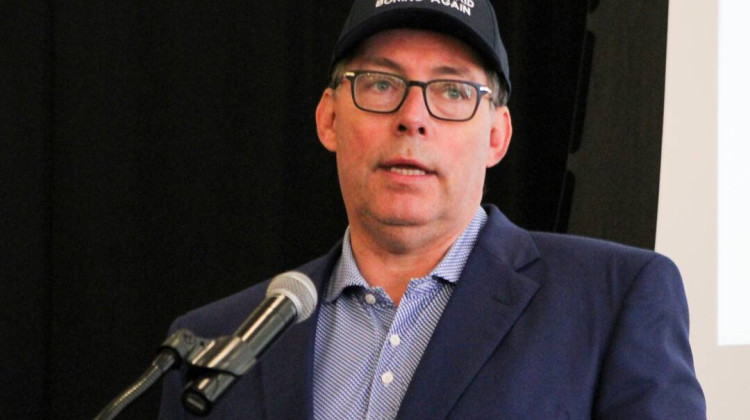
FSSA Secretary Mitch Roob said the federal legislation would give the Centers for Medicare and Medicaid Services the authority to deny Indiana's request for the new managed care tax.
Abigail Ruhman / IPB NewsPolicy proposals in the federal reconciliation bill could put Indiana's new Medicaid expansion funding structure in jeopardy. The Family and Social Services Administration said it's trying to get federal approval on the new funding structure before that bill is signed into law.
The new funding structure makes some adjustments to a tax that already exists on hospitals. The main change comes from a new tax on insurance companies or managed care organizations.
However, the federal legislation prohibits states from increasing or creating new versions of these types of taxes.
FSSA Secretary Mitch Roob said the federal legislation would give the Centers for Medicare and Medicaid Services the authority to deny the Indiana's request for the new managed care tax.
"They are seeking to obtain that authority, and we are seeking to get our tax approved before they may get that authority," Roob said."
READ MORE: Hoosiers call on Indiana's U.S. senators to vote 'no' on cuts to SNAP, Medicaid, Medicare
House Enrolled Act 1004 introduced the Hospital Assessment Fee redesign, which was previously its own legislation.
The tax would be used to help increase the reimbursement rate for Indiana hospitals. For years, hospital leaders have said an increase is necessary — especially for rural hospitals.
The federal government covers 90 percent of the Medicaid expansion program. That means Indiana is responsible for 10 percent of the Healthy Indiana Plan, or HIP, as well as the costs to administer the program.
But, Indiana doesn't actually pay those costs. Currently, 90 percent of the state's portion is covered by a provider tax on hospitals known as the Hospital Assessment Fee and the rest is covered by cigarette taxes. The Hospital Assessment Fee is used to reimburse hospitals at a higher rate than they were taxed, but the reimbursement rate has been extremely low for years according to hospital leaders.
The administrative costs for the program are currently taken out of the tax on hospitals.
Under the new funding structure, insurance companies would be taxed enough to cover the amount lost to cover the administrative costs, which is about $300 million. During the legislative session, a fiscal analysis found this would result in Medicaid reimbursement rising from $0.57 to about $0.80 with an emphasis on supporting more rural and smaller hospitals.
Roob said he spoke with officials from the CMS to prepare them for Indiana's application for new provider taxes, which he plans to submit this week.
"We're racing against the signature on the Big, Beautiful Bill," Roob said.
Join the conversation and sign up for the Indiana Two-Way. Text "Indiana" to 765-275-1120. Your comments and questions in response to our weekly text help us find the answers you need on Medicaid and other statewide issues.
About 20 other states have a tax on insurance companies known as a managed care assessment fee.
Roob said the Managed Care Assessment Fee is the more difficult of the two taxes to deal with because the Hospital Assessment Fee change isn't really an increase or a new tax in the same way that the tax on the insurance companies is.
"The Hospital Assessment Fee we are changing from being a from net patient days to net patient revenue," Roob said. "It appears in the Big, Beautiful Bill, the 6 percent ceiling is preserved. … We were concerned it would be capped at 5 percent. That is not the case in the Big, Beautiful Bill that passed [the U.S. House]. We are planning on working through that tax."
Roob said FSSA is pursuing the changes that the General Assembly asked FSSA to pursue — but even if the changes are approved, that may not be the end of the issue.
"[CMS is] seeking regulatory authority to have it become more redistributive. So we would be forced to raise taxes on insured people, as well as the uninsured, the privately and publicly insured people," Roob said. "Whether or not the General Assembly would want that to happen, I think, is an open question — and we'll have to see how CMS operates."
Leo Cuello, a research professor at the Georgetown Center for Children and Families, said the language on provider taxes means states are limited on how they can react to the major cuts to federal funding.
"At the same time you're cutting their federal funding, you're telling them you can't tax providers to make up for the losses in federal dollars," Cuello said. "You're sinking the boat, and you're burning the lifeboats, right? And so now the states are taking this huge cut, and don't have a way to make up the money."
Cuello said this will make it harder for states to finance the Medicaid program in the wake of the changes present in the federal reconciliation bill.
The federal reconciliation bill is currently in the U.S. Senate, where it needs a simple majority to pass.
Abigail is our health reporter. Contact them at aruhman@wboi.org or on Signal at IPBHealthRuhman.65.
 DONATE
DONATE






 Support WFYI. We can't do it without you.
Support WFYI. We can't do it without you.